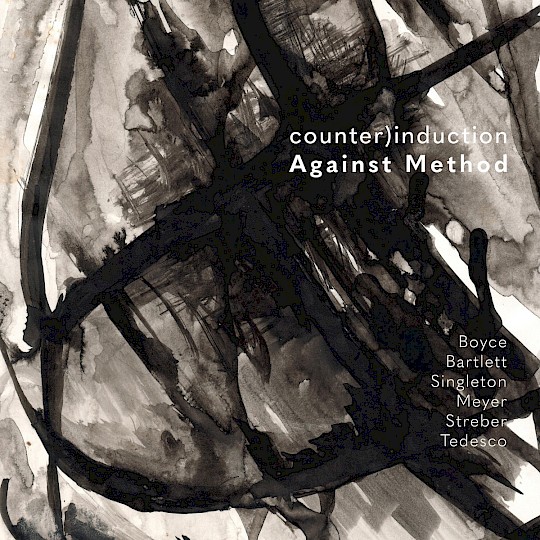counter)induction

Against Method
Counter)induction – Benjamin Fingland, clarinet; Miranda Cuckson, violin;
Jessica Meyer, viola; Caleb van der Swaagh, cello, Randall Zigler, bass;
Renate Rolfing, Ning Yu, piano; Daniel Lippel, guitar
New Focus Recordings CD/DL
Chamber ensemble/composer collective counter)induction celebrates twenty years together with the recording Against Method. It consists of pieces contributed by composers associated with the collective as well those by “guest composers.” counter)induction has distinguished itself with a versatile approach to new music, selecting works with a keen eye toward musicality and a clear resistance to stylistic dogma. Against Method neatly encapsulates this approach.
Douglas Boyce’s Hunt by Night is an ostinato filled trio at a propulsive tempo for clarinet, cello, and piano. The piece also features glissandos and blurred microtonal inflections that offset the repeated pitches and chords nicely. Before, by Kyle Bartlett, is another trio, this time for clarinet, cello, and guitar. Wisps of texture are succeeded by noisy angularity with scratch tone effects. The unity provided by shared effects makes this broken consort sound at times like a single instrument. The sound spectrum moves between noise and dissonant counterpoint to create formal boundaries. Further along, the trio breaks up into characterful solos, notably a lithe cadenza by guitarist Daniel Lippel, which concludes the work.
Lippel switches to electric guitar, accompanied by clarinetist Benjamin Fingland, vibraphonist Jeffrey Irving, cellist Caleb van der Swaagh, pianist Renate Rolfing, and bassist Randall Zigler in Alvin Singleton’s Ein Kleines Volkslied. Rock-inspired chord progressions are played on the guitar, tremolando strings are emphatically rendered at key points alongside bluesy clarinet riffs, pizzicato bass, and jazz-inflected vibraphone arpeggiations. A bustling section overlaps these various playing styles, cut off again and again by tremolandos only to reassert itself. Bass clarinet, guitar, and vibes take over, their parts fragmenting the motives found in the beginning of the piece. Finally, a pileup of all the various elements creates a contrapuntal conclusion. Fingland plays Jessica Meyer’s Forgiveness, in which a loop pedal plays a prominent role. Air through the mouthpiece begins the piece followed by sustained pitches, all of which the loop pedal allows to overlap into clustered textures and tight counterpoint. Looping has become a favorite of new music composers, but Meyer distinguishes her piece with an organic approach to the sounds of playing and a fine ear for the pitch relationships that result in overlapping.
Ryan Streber’s Piano Quartet is the most formidable composition on Against Method. The various instruments move at different rates, creating a Carterian sense of time flow. Streber also has a finely attuned ear for the selection and spacing of post-tonal harmonies. The linear component, with a number of imitative passages, is also finely wrought. The ensemble comprehensively knows the piece, delivering a performance that is assured and engaging throughout.
The recording concludes with Scherzo by Diego Tedesco, a piece filled with descending chromatic scales that provide a jocular motive that appears in countless contexts throughout the piece. Tedesco blends pizzicatos from guitar and strings to good effect, followed by the aforementioned glissandos in cascading overlaps of sound. Particularly affecting is the middle section, which is an “eye of the storm” where the piece’s motives are fragmented and delicately hued. Clarinet and guitar are given an extended duet that is followed by an eruptive passage in the strings. Pizzicato and glissandos succeed in turn to create a clear juxtaposition of playing styles, at key points blending to create transitions between sections. Tight dissonances between violin and clarinet ratchet up the tension, which is finally allowed release in a sustained note from the clarinet followed by violin multi-stops. Scherzo is well- constructed, devised to show counter)induction to their best advantage. Top to bottom, Against Method is a stirring listen.
-Christian Carey